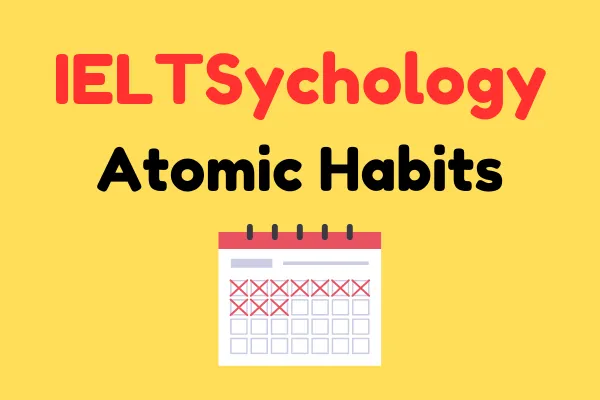

Blog
Here you can find tips, strategies, materials and free lessons
to help you pass each section of the IELTS exam.

How Atomic Habits can help you Pass the IELTS Exam
IELTSychology:
How Atomic Habits can Help you
Pass the IELTS Exam
What are Atomic Habits?
It’s no secret that I am a big fan of James Clear’s Atomic Habits.
I’ve read it twice through, in English and Spanish, often go back to sections of it for reference, and will surely read it again soon.
It’s great.
It’s full of practical, actionable advice about how to change your life for the better, by making small changes to your daily habits.
Most of it is common sense, or things that deep down you already know from your own lived experience, but for this very reason it has been invaluable in helping me reflect on my own personal and professional life.
Indeed, I now put many of the book’s principles into practice in my daily life, and also, importantly for you guys, my work as an IELTS instructor, where I help students form strong habits which will help them improve their English, pass the exam, and reach their academic goals.
I would highly recommend you read it yourself, as it’s clear (ha ha), concise and written at an accessible level for intermediate-advanced students.
A lil' listening activity:
However, in the meantime you can watch this great little summary video, and complete the following listening exercise:
Watch this video and think ...
“How could I apply these strategies to improving my English and passing the IELTS exam?”
Once you finish watching the video, read below to check out some of my suggested answers.
Or, if you're in a bit of a hurry, read the rest of the blog first, then come back and watch the video later.
Here's some ideas I've had about how you can use Atomic Habits to prepare yourself for the IELTS exam:
Think about systems rather than goals:
While the end goal of achieving a band 7 is important, rather than simply aiming for that, start by focusing on improving your daily study system, and start by implementing small, manageable habits.
Begin your IELTS preparation by breaking down language learning into small, achievable tasks. For example. you can commit to studying vocabulary for just 10 minutes each day or listening to a podcast in English during your daily commute. By starting small, you reduce resistance, make it easier to get started, and make it easier to practice consistently.
Think about identity rather than activity:
Instead of thinking: "I am studying English", think: "I am an English student"; instead of thinking: "I am learning about the IELTS speaking exam", think: "I am an IELTS candidate"; instead of thinking "I am planning to study a master's next year", think "I am a master's candidate in formation".
This shift in identity can help shape your behaviour and make language learning a part of who you are. Act like the person you want to become and you the good study habits will follow.
Make it obvious:
Create a clear environment that reminds you of your language learning goals.
Place language learning materials, such as textbooks or flashcards, in visible locations. Set reminders on your phone or computer to study or practice regularly. Organise your digital environment by changing the language on your phone to English and replacing social media widgets with learning apps such as BBC Learning English, Anki, or the British Council’s IELTS app.
You can also pair your language learning habit with an existing habit you already have. For example, if you have a morning coffee routine, you can decide to review vocabulary while sipping your coffee.
By linking your new habit with an established one, you increase the chances of consistently following through.
The idea is to make it hard to ignore or forget your language learning habits.
Make it attractive:
Associate your IELTS preparation with something you already enjoy.
Once studying vocabulary becomes associated with enjoying your morning coffee, it’ll become much easier to maintain the habit.
I personally love reading in Spanish every night before I go to sleep. After a long day of hard work, I associate reading (and improving my Spanish) with rest and relaxation. I have other students who listen to English podcasts while walking the dog or working out. Again, they associate improving their English with something they love doing.
Also, becoming part of a community of learners, and even making a contract with them, can motivate you to keep your commitment to studying, as you’ll receive social recognition for being hardworking, disciplined and successful.
Make it easy:
Set up a regular schedule; consistency and repetition are key in language learning. Determine a specific, convenient time and place each day for English practice and stick to it.
"I will <read for 10 minutes> at 12:00 in <the work cafeteria>"
Treat it as a non-negotiable appointment with yourself. Over time, this regular schedule will help reinforce the habit and make it easier to maintain.
In addition, set small daily goals. Aim to read at least a page of a book in English every day, and you’ll not only achieve this, but you’ll regularly go beyond this goal, feel great, and continue making progress.
Don’t set unrealistic goals. If you aim to read 50 pages every day, you’ll most likely not achieve this, feel disappointed, give up and end up reading nothing.
Ideally, you'll practice every day, but life sometimes gets in the way. You may have an emergency meeting at work, or you might get sick.
Missing a day once in a while is Ok, but make sure never to miss two. Even if you only read 1 page a day, listen to a podcast for 1 minute a day, or review 1 word of vocabulary every day, the important thing is to maintain the habit and to study every day.
Make it satisfying:
Track your progress. Keep a record of your language learning efforts. Use a calendar as a habit tracker or a simple journal to mark off each day you complete your language practice. Seeing your progress visually can be motivating and reinforce your commitment to the habit.
Again, if you can see a long chain of small victories, you will be motivated to maintain the habit.
You can also employ habit reinforcement. Pair your language learning habit with a reward to reinforce the behavior. For example, after completing a study session, you could allow yourself to watch a short video or engage in an enjoyable activity related to the language, such as listening to music or watching a movie in your target language. The reward should be something that reinforces the positive feeling of completing the habit.
Conclusions:
Rather than (or maybe as well as) thinking of your overall goal of getting a band 7 in the IELTS and studying at a top university, think about making small adjustments to your daily routine.
Rather than studying a bit of IELTS here and there, you should become an IELTS candidate. Making changes to your life at the level of personal identity will have a powerful effect on your habits.
Organise your environment so that there are minimal barriers to study and connect study habits to existing parts of your daily routine.
Set minimal, achievable daily goals and aim to be consistent. If you miss a day, that's Ok, make sure you never miss two.
Make your study habits enjoyable and satisfying. Do things you enjoy, keep a visual record your habit, and reward yourself for maintaining your consistent study.
If you do all of the above, you are guaranteed to get a higher score in the IELTS exam.
Get an English copy of Atomic Habits and read a couple of pages of it every day!



